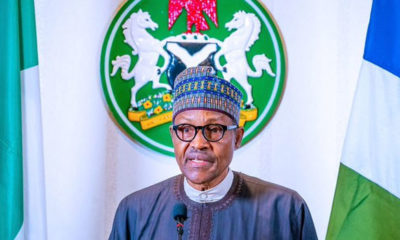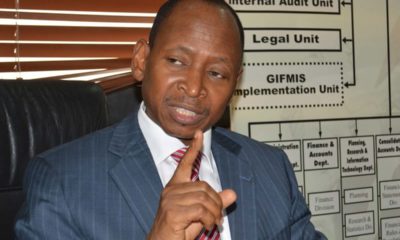Socio-Economic Rights and Accountability Project (SERAP) has filed a lawsuit, asking the court “to compel President Muhammadu Buhari to disclose spending details of the overdrafts and loans obtained from the Central Bank of Nigeria (CBN) since May 29, 2015, including the projects on which the overdrafts have been spent, and repayments of all overdrafts to date.”
SERAP is also seeking an order to compel the president to “explain and clarify whether the $25bn (N9.7trn) overdraft reportedly obtained from the CBN is within the five-percent limit of the actual revenue of the government for 2020.”
The suit followed SERAP’s Freedom of Information (FoI) request to President Buhari, stating that: “Disclosing details of overdrafts and repayments would enable Nigerians to hold the government to account for its fiscal management and ensure that public funds are not mismanaged or diverted.”
In the suit number FHC/ABJ/CS/559/2021 filed last week at the Federal High Court, Abuja, SERAP is also seeking: “an order directing and compelling President Buhari to disclose details of overdrafts taken from the CBN by successive governments between 1999 and 2015.”
In the suit, SERAP is arguing that: “Secrecy and the lack of public scrutiny of the details of CBN overdrafts and repayments are antithetical to the public interest, the common good, the country’s international legal obligations, and a fundamental breach of constitutional oath of office.”
Joined in the suit as respondents are the Attorney General of the Federation and Minister of Justice, Abubakar Malami, SAN; the Minister of Finance, Budget and National Planning, Zainab Ahmed; and the Governor of CBN, Godwin Emefiele.
SERAP is also arguing that: “Ensuring transparency and accountability in the spending of CBN overdrafts and loans would promote prudence in debt management, reduce any risks of corruption and mismanagement, and help the government to avoid the pitfalls of excessive debt.”
According to SERAP: “By the combined reading of the Constitution of Nigeria 1999 (as amended), the Freedom of Information Act, the UN Convention against Corruption, and the African Charter on Human and Peoples’ Rights, there are transparency obligations imposed on the government to disclose information to the public concerning details of CBN overdrafts, loans and repayments to date.”
SERAP is also arguing that: “The Nigerian Constitution, Freedom of Information Act, and these treaties rest on the basic principle that citizens should have access to information regarding their government’s activities.”
The suit filed on behalf of SERAP by its lawyers Kolawole Oluwadare and Ms Adelanke Aremo, read in part: “Transparency and accountability in the spending of CBN overdrafts would also ensure that public funds are properly spent, reduce the level of public debt, and improve the ability of the government to invest in essential public goods and services, such as quality education, healthcare, and clean water.”
“It is the primary responsibility of the government to ensure public access to these services in order to lift millions of Nigerians out of poverty and to achieve the Sustainable Development Goals by 2030.”
“Transparency and accountability in the spending of CBN overdrafts and loans would also improve the ability of the government to effectively respond to the COVID-19 crisis. This means that the government would not have to choose between saving lives or making debt payments.”
“The recent overdraft of $25.6bn (about N9.7trn) reportedly obtained from the CBN would appear to be above the five-percent limit of the actual revenue of the Federal Government for 2020, that is, N3.9trn, prescribed by Section 38(2) of the CBN Act 2007. SERAP notes that 5 percent of N3.9trn is N197bn.”
“While Section 38(1) of the CBN Act allows the Bank to grant overdrafts to the Federal Government to address any temporary deficiency of budget revenue, sub-section 2 provides that any outstanding overdraft ‘shall not exceed 5 percent of the previous year’s actual revenue of the Federal Government.’”
“Similarly, Section 38(3) requires all overdrafts to ‘be repaid as soon as possible and by the end of the financial year in which the overdrafts are granted.’”
“The CBN is prohibited from granting any further overdrafts until all outstanding overdrafts have been fully repaid. Under the CBN Act, ‘no repayment shall take the form of a promising note or such other promise to pay at a future date, treasury bills, bonds or other forms of security which is required to be underwritten by the Bank.’”
“Similarly, the Fiscal Responsibility Act provides in section 41 that the government ‘shall only borrow for capital expenditure and human development.’ Under the Act, the government ‘shall ensure that the level of public debt as a proportion of national income is held at a sustainable level.’”
“Section 44 of the Fiscal Responsibility Act requires the government to specify the purpose of any borrowing, which must be applied towards capital expenditures, and to carry out a cost-benefit analysis, including the economic and social benefits of any borrowing. Any borrowing should serve the public good, and be guided by human rights principles.”
“SERAP has consistently recommended to the Federal Government to reduce its level of borrowing and to look at other options of how to finance its budget, such as reducing the costs of governance, and addressing systemic and widespread corruption in ministries, departments and agencies (MDAs) that have been documented by the Office of the Auditor-General of the Federation.”
“Our requests are brought in the public interest, and in keeping with the requirements of the Nigerian Constitution; the Freedom of Information Act; the Fiscal Responsibility Act; the Central Bank Act; the Debt Management Office Act; and the country’s international legal obligations.”
“There is a statutory obligation on the respondents, being public officers in their respective public offices, to proactively keep, organize and maintain all information or records about CBN overdrafts, loans, and repayments in a manner that facilitates public access to such information or records.”
“Mandamus lies to secure the performance of a public duty in the performance in which the applicant has a sufficient legal interest.”
“Unless the reliefs sought by SERAP are granted, the respondents will not provide SERAP with the information requested and will continue to be in breach of their constitutional responsibilities and the country’s international legal obligations and commitments.”
No date has been fixed for the hearing of the suit.


 Billionaire Watch3 weeks ago
Billionaire Watch3 weeks ago
 Startups4 weeks ago
Startups4 weeks ago
 News4 weeks ago
News4 weeks ago
 News4 weeks ago
News4 weeks ago
 Bitcoin4 weeks ago
Bitcoin4 weeks ago
 Naira4 weeks ago
Naira4 weeks ago
 Forex3 weeks ago
Forex3 weeks ago
 Treasury Bills4 weeks ago
Treasury Bills4 weeks ago


























